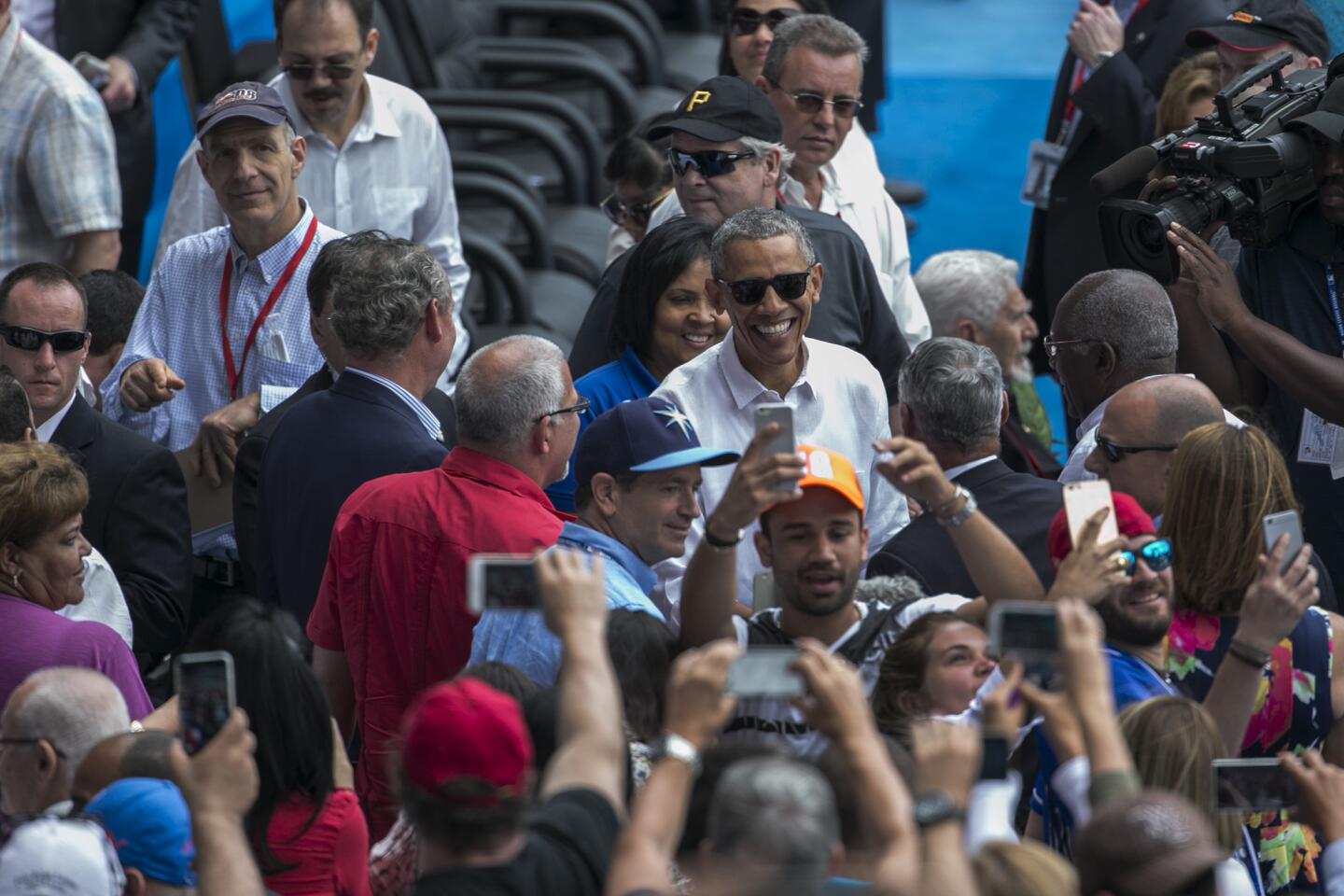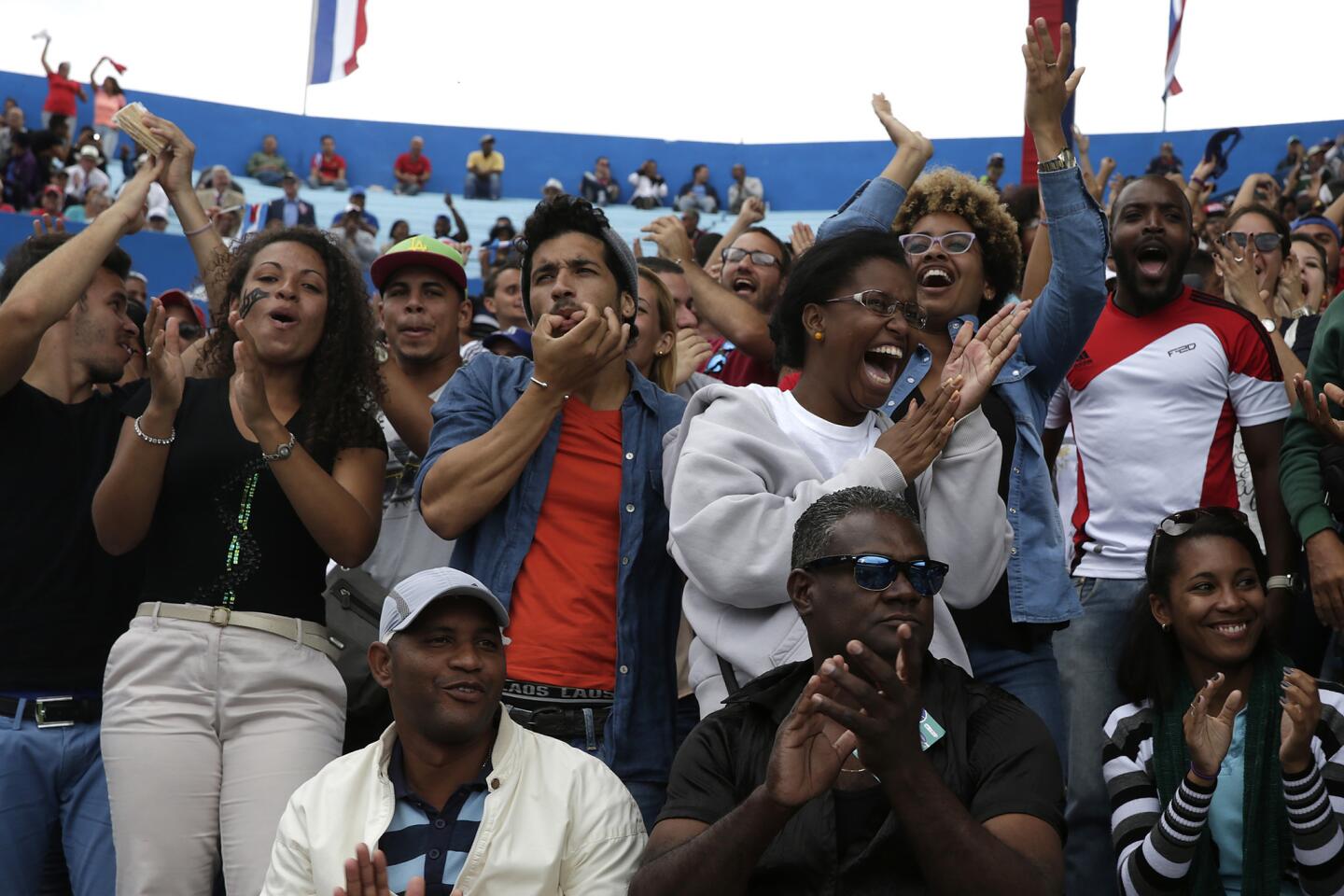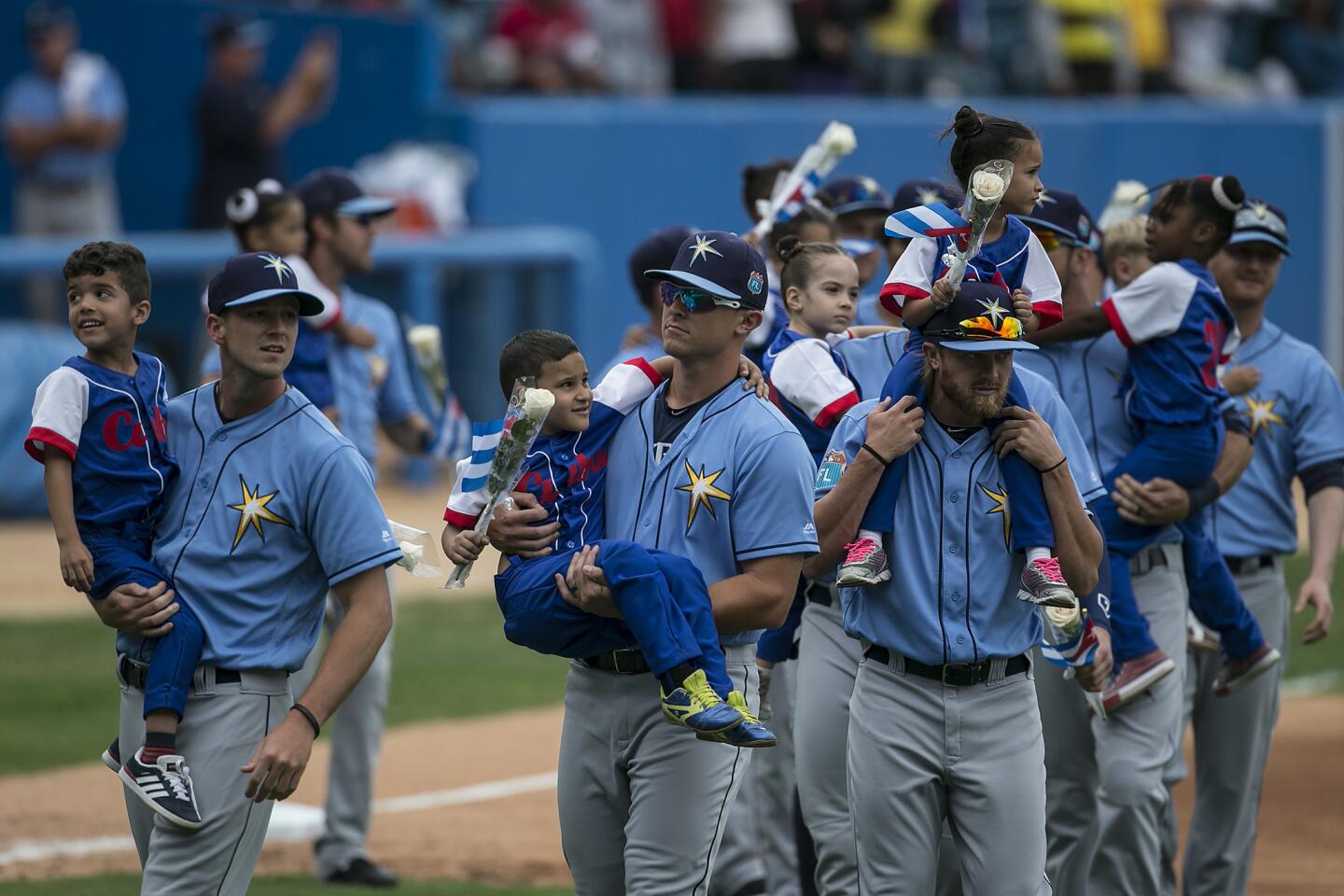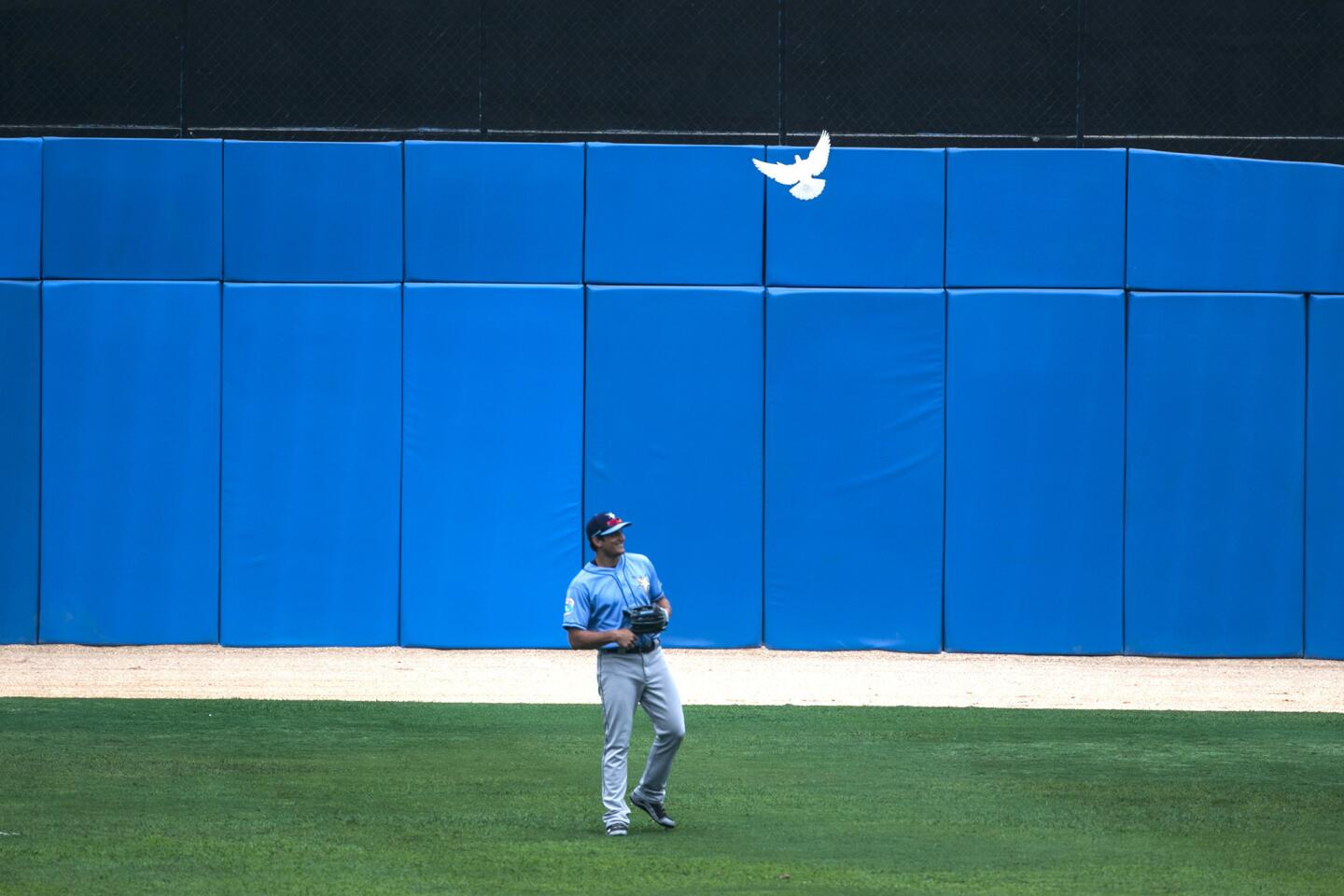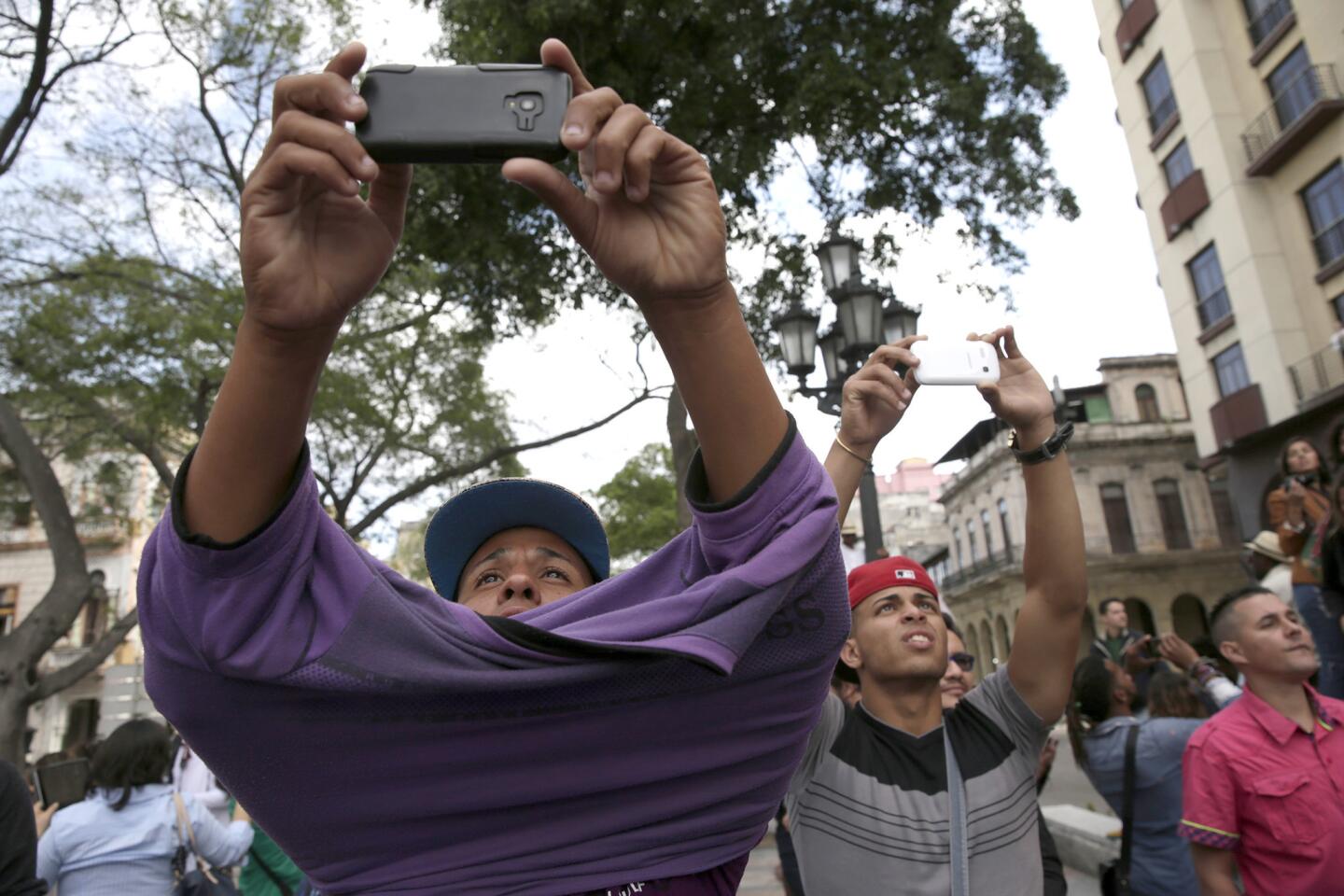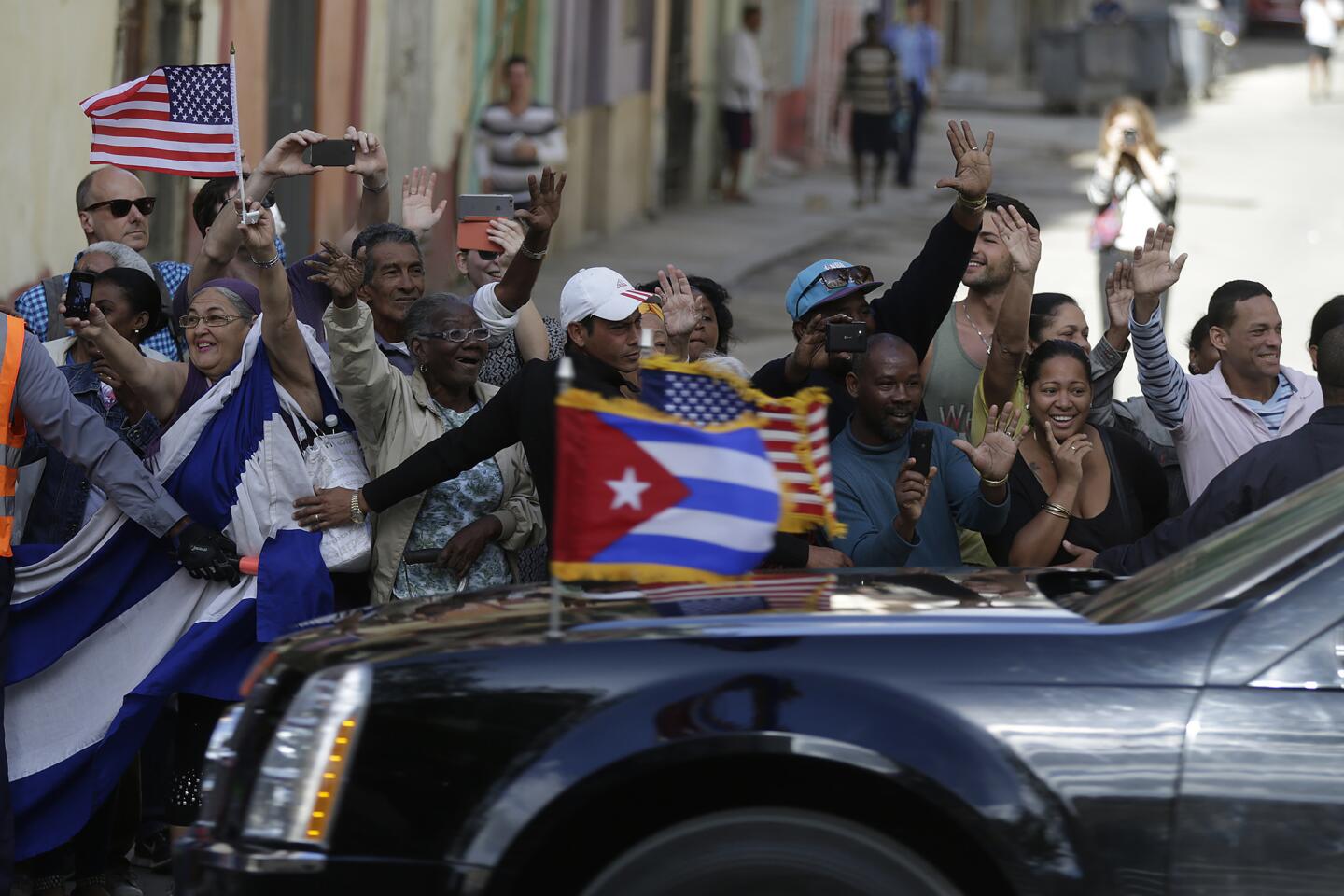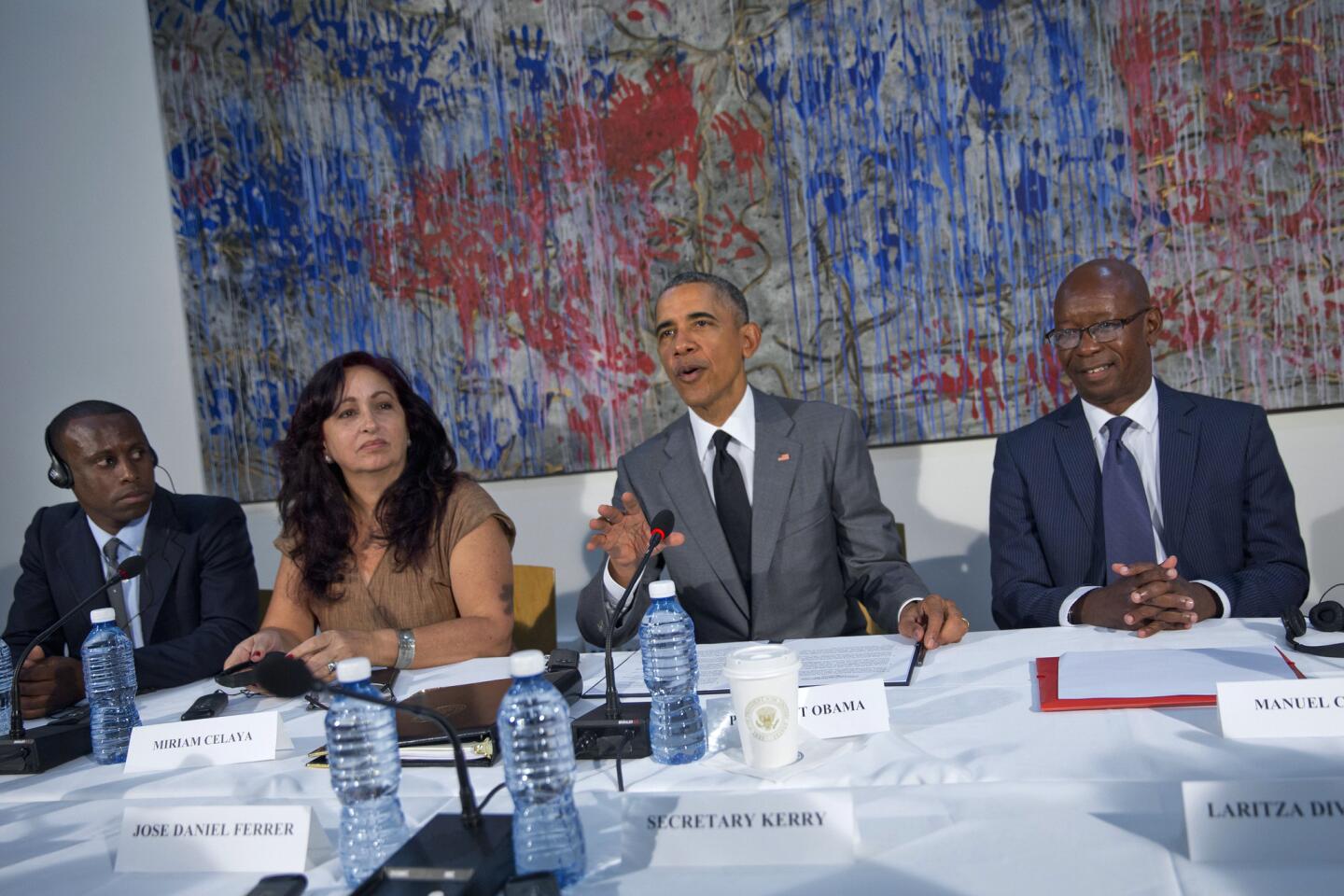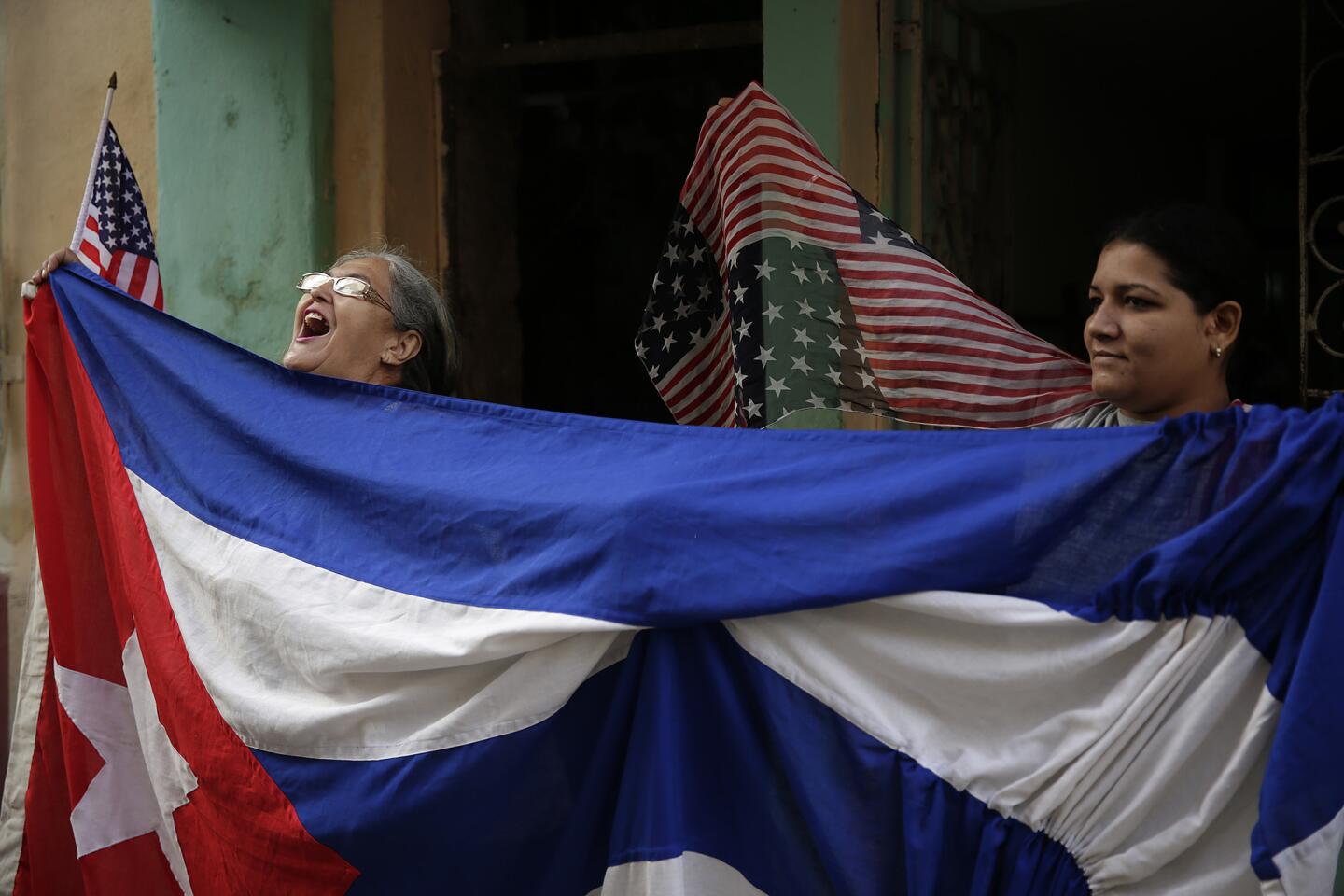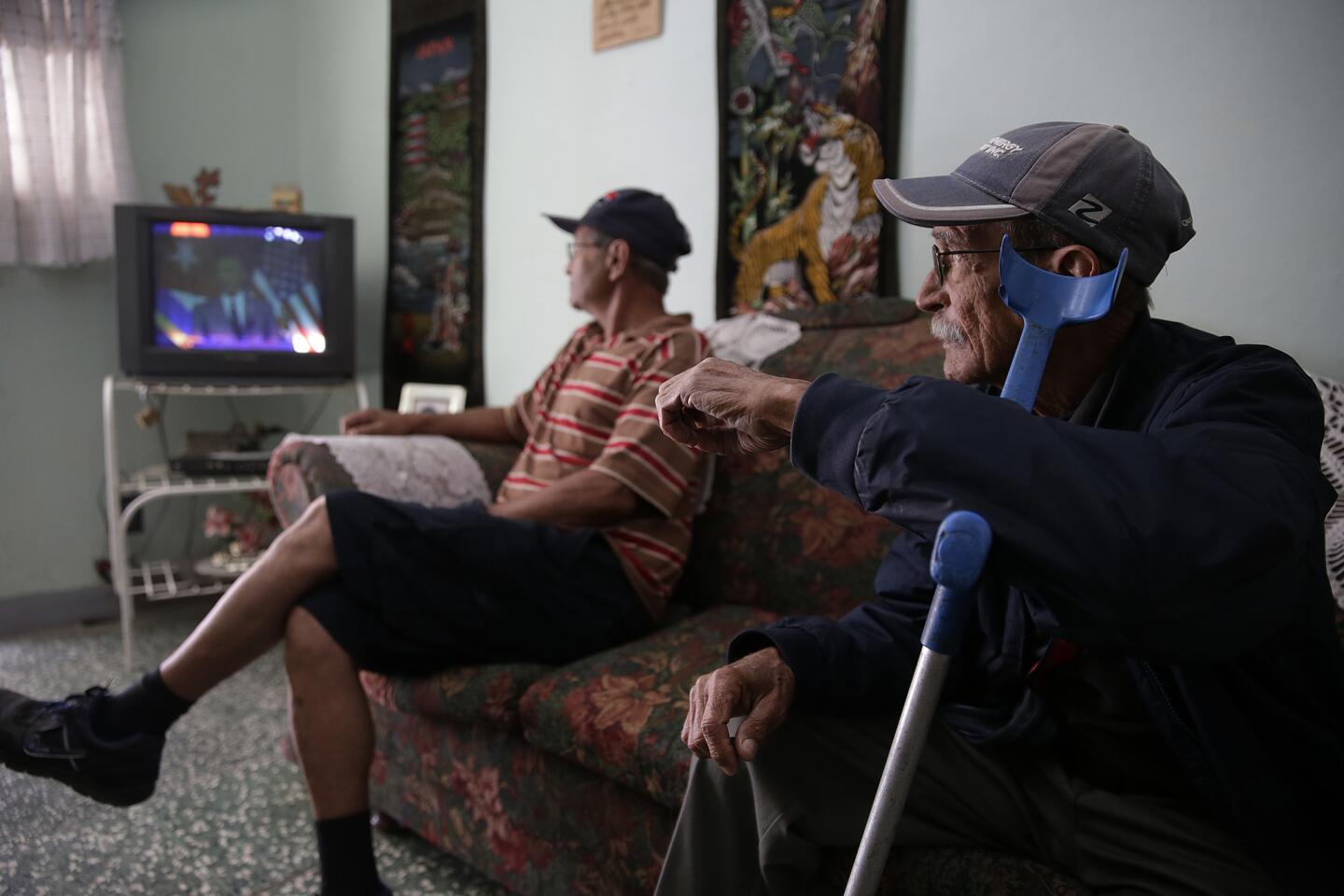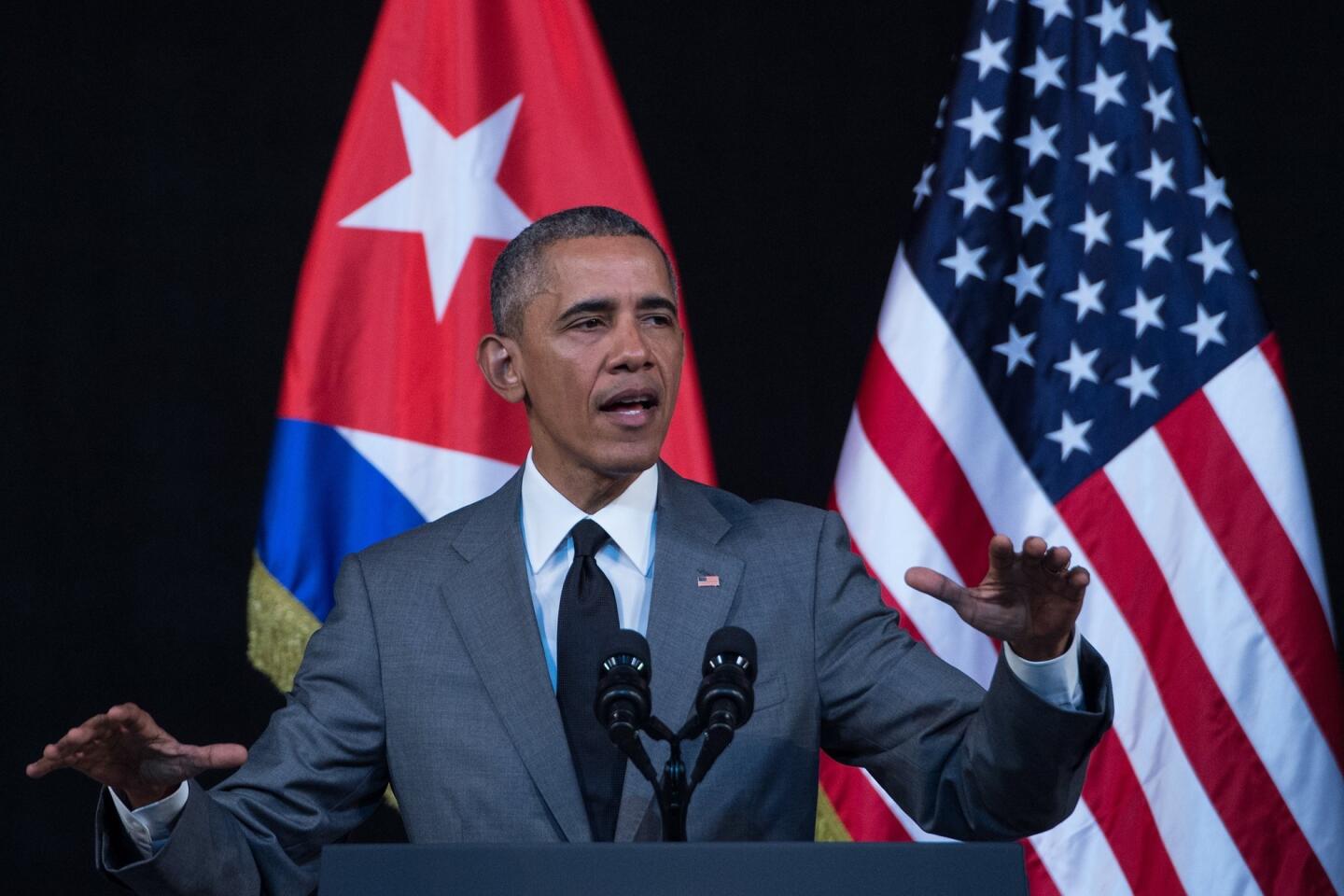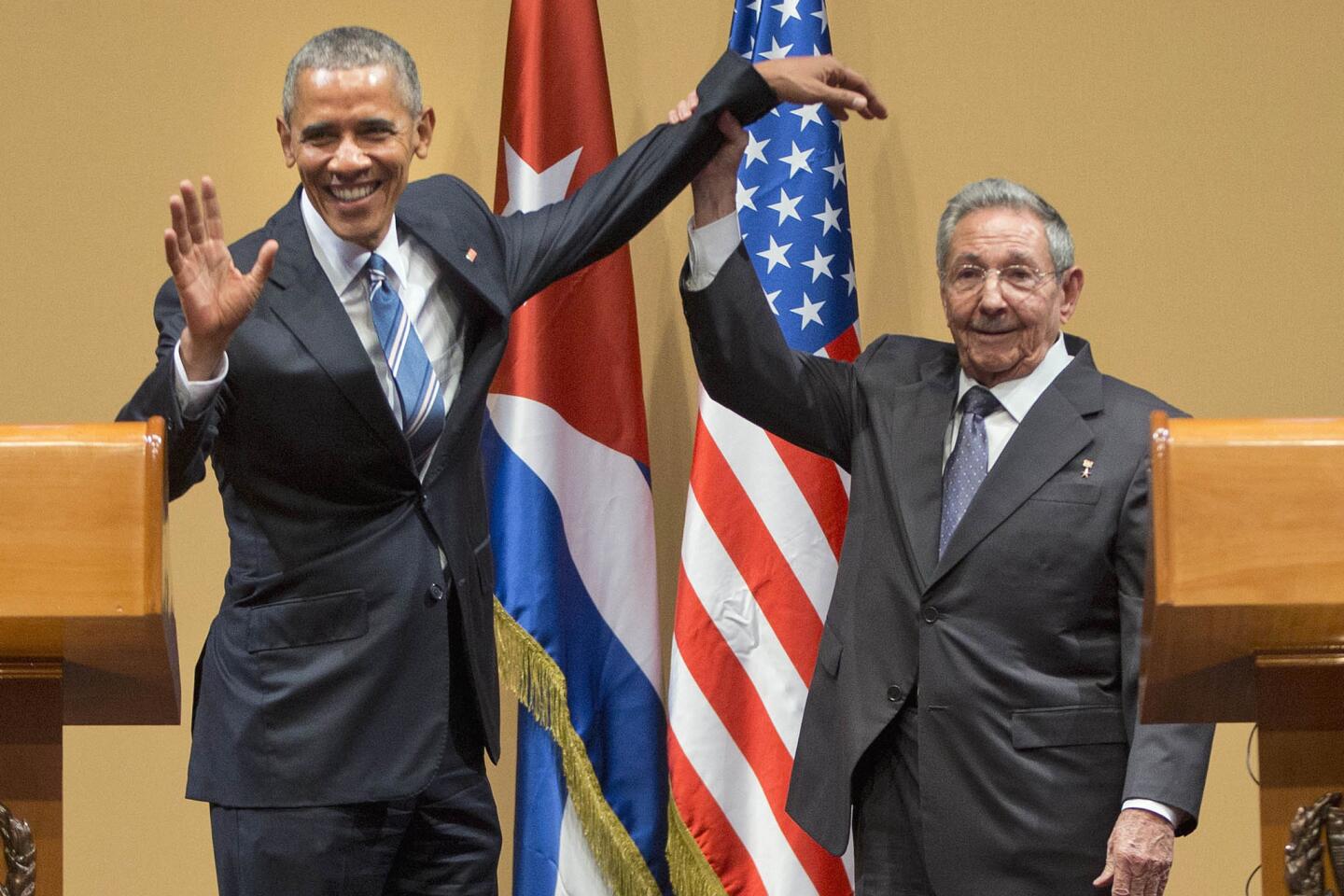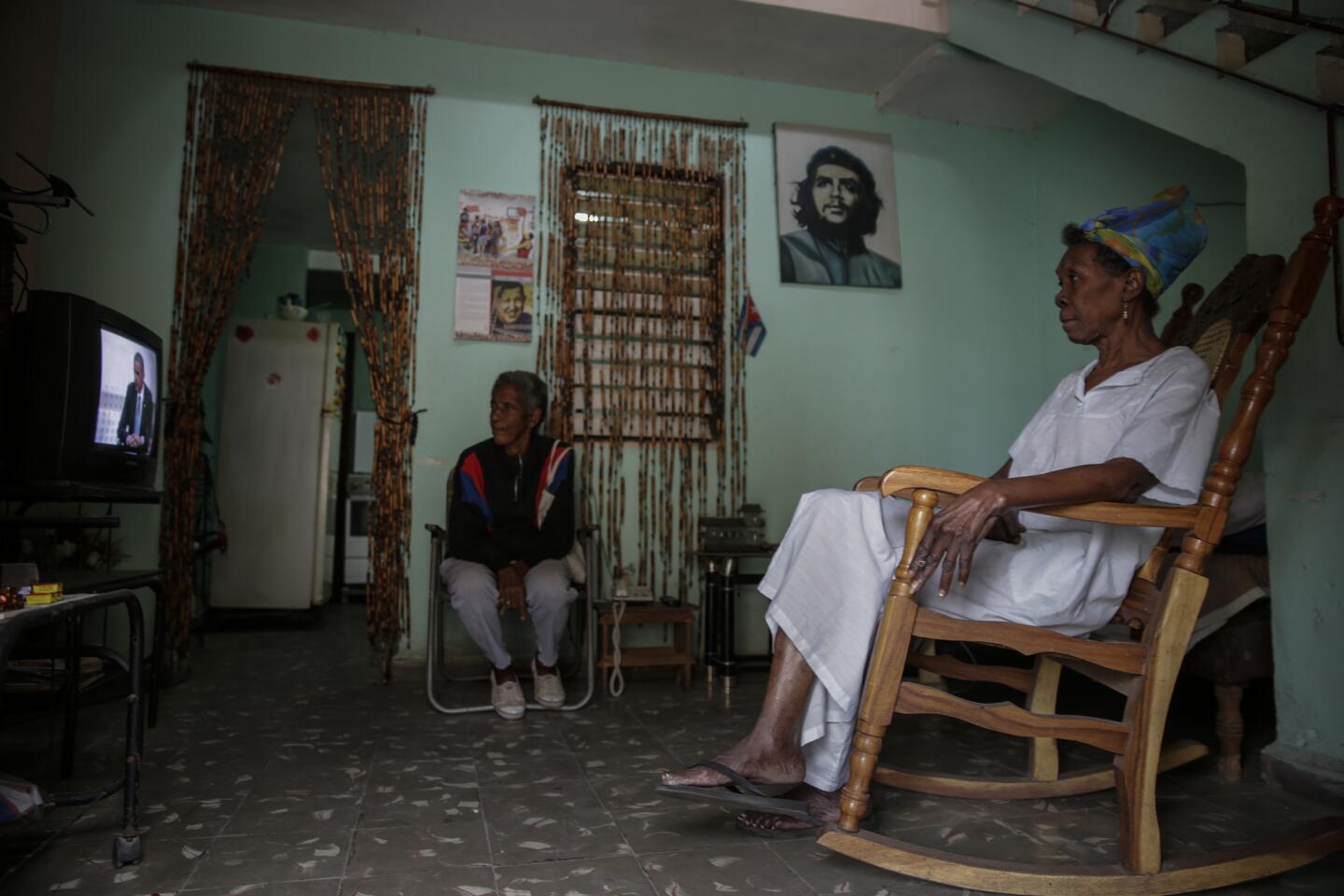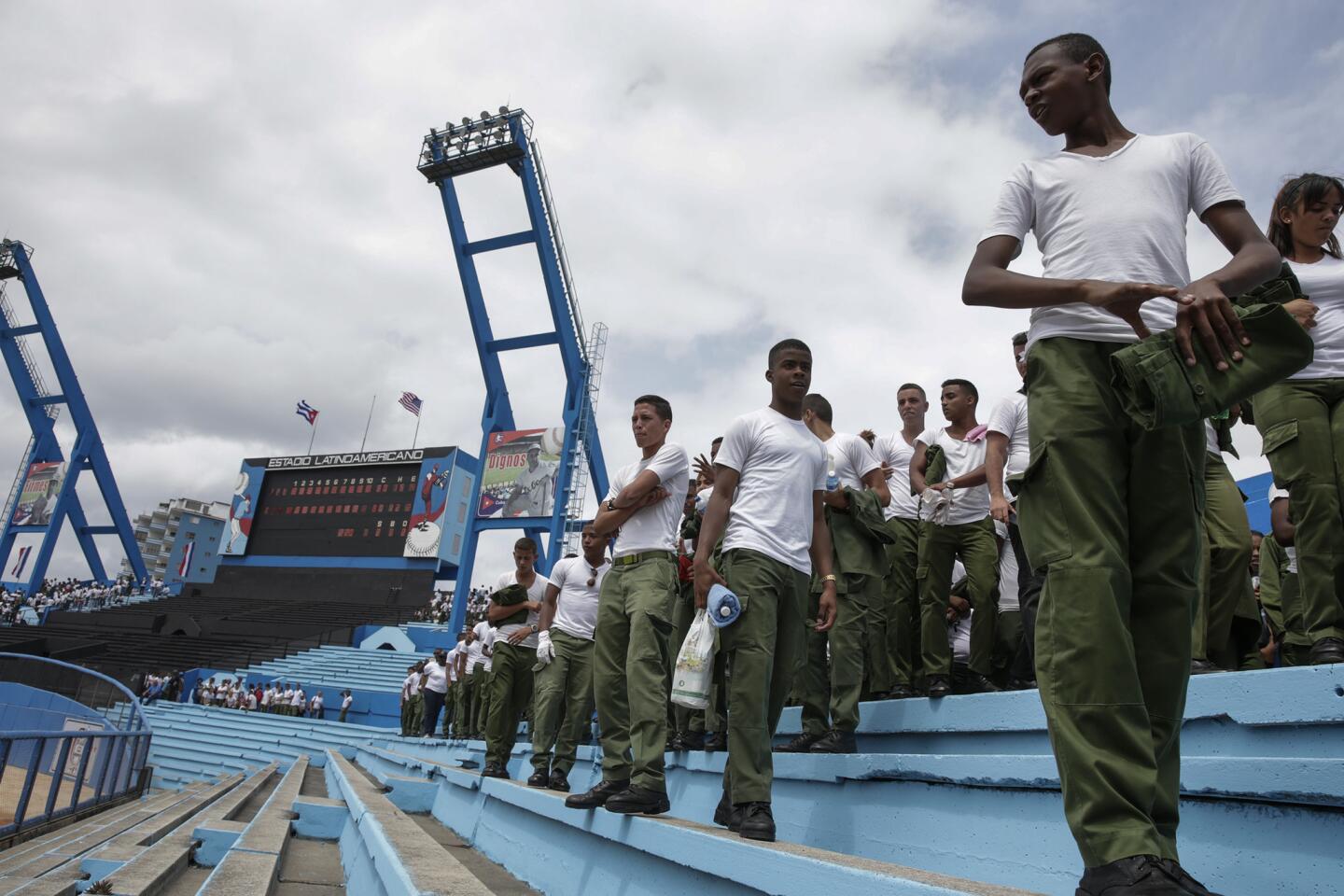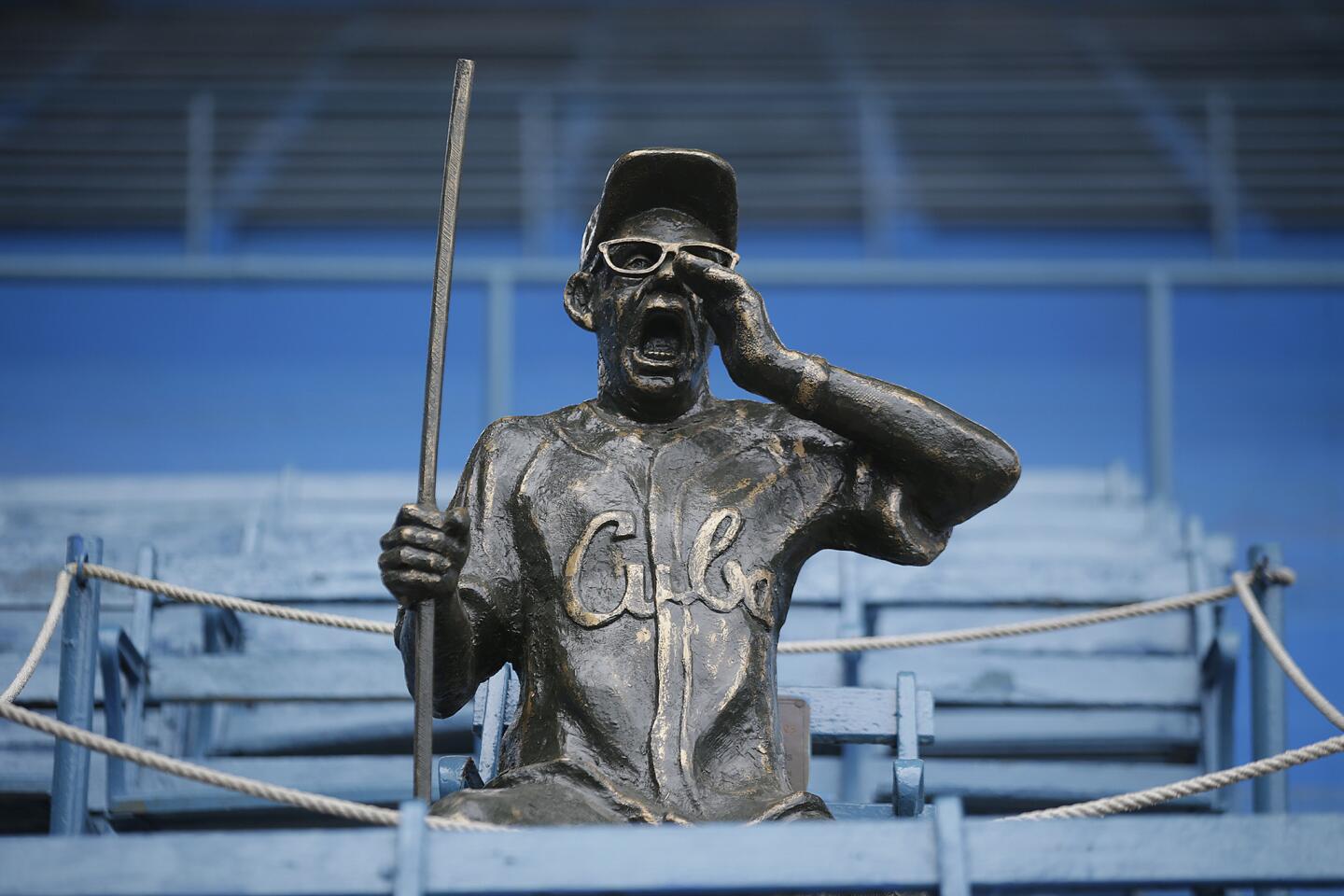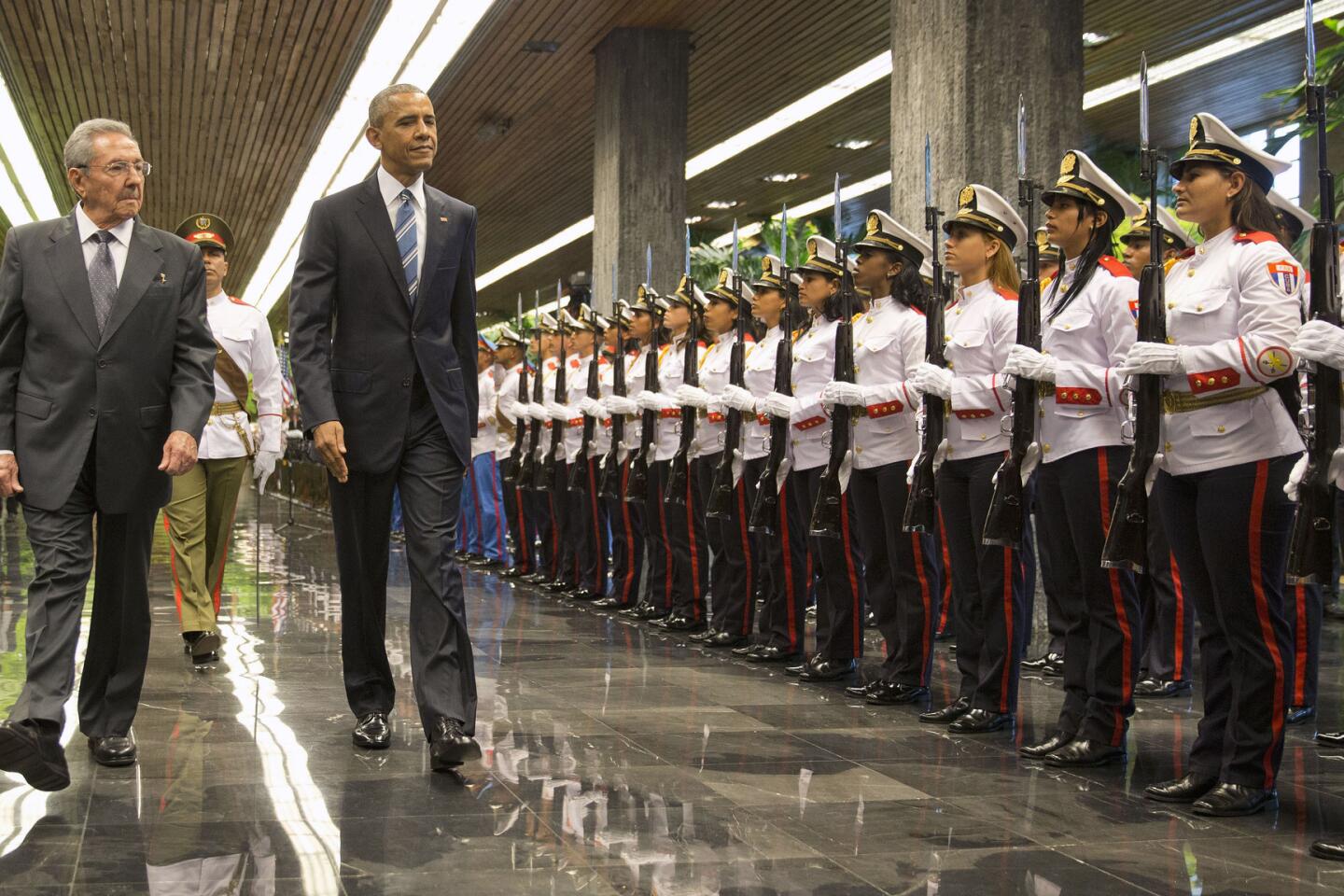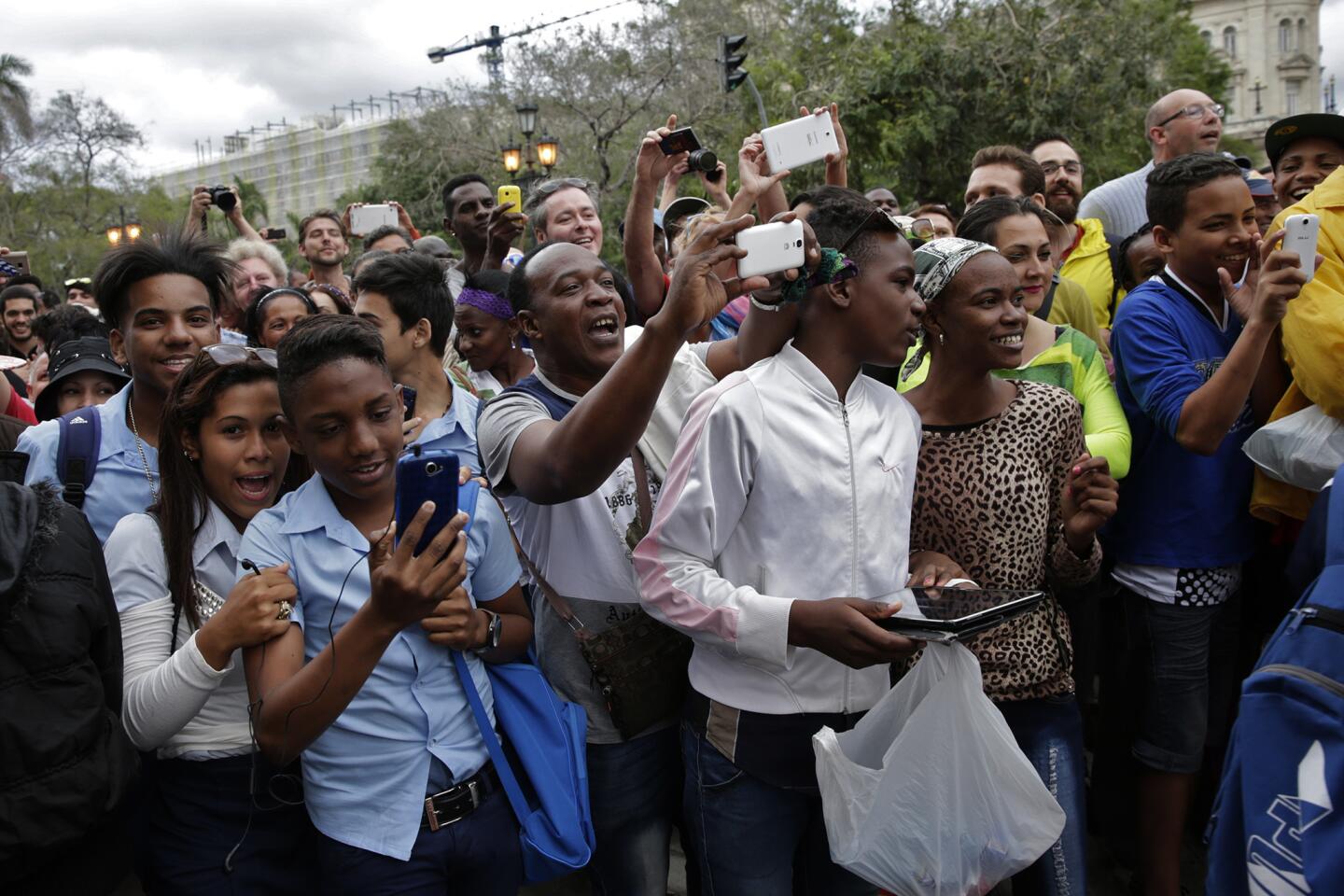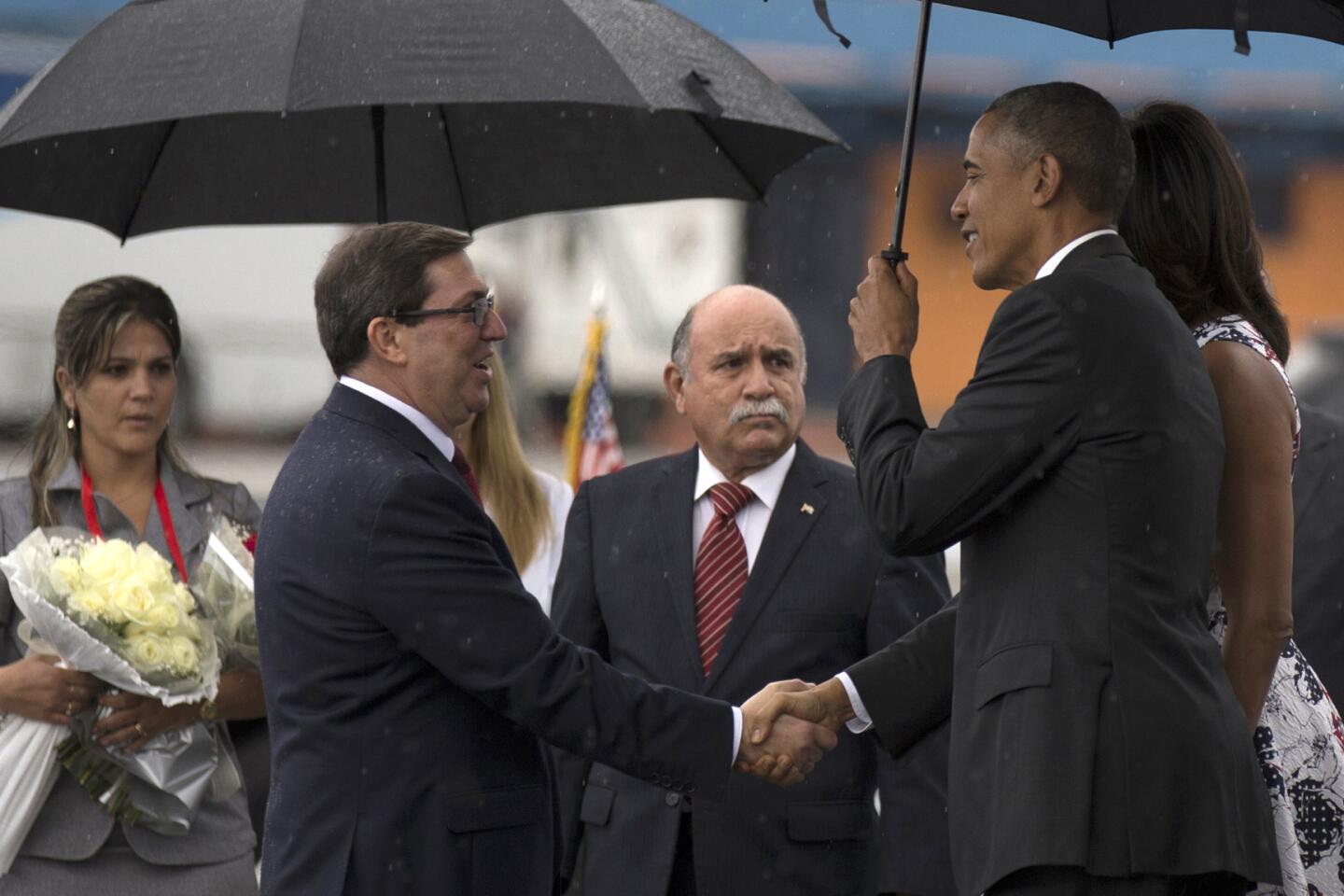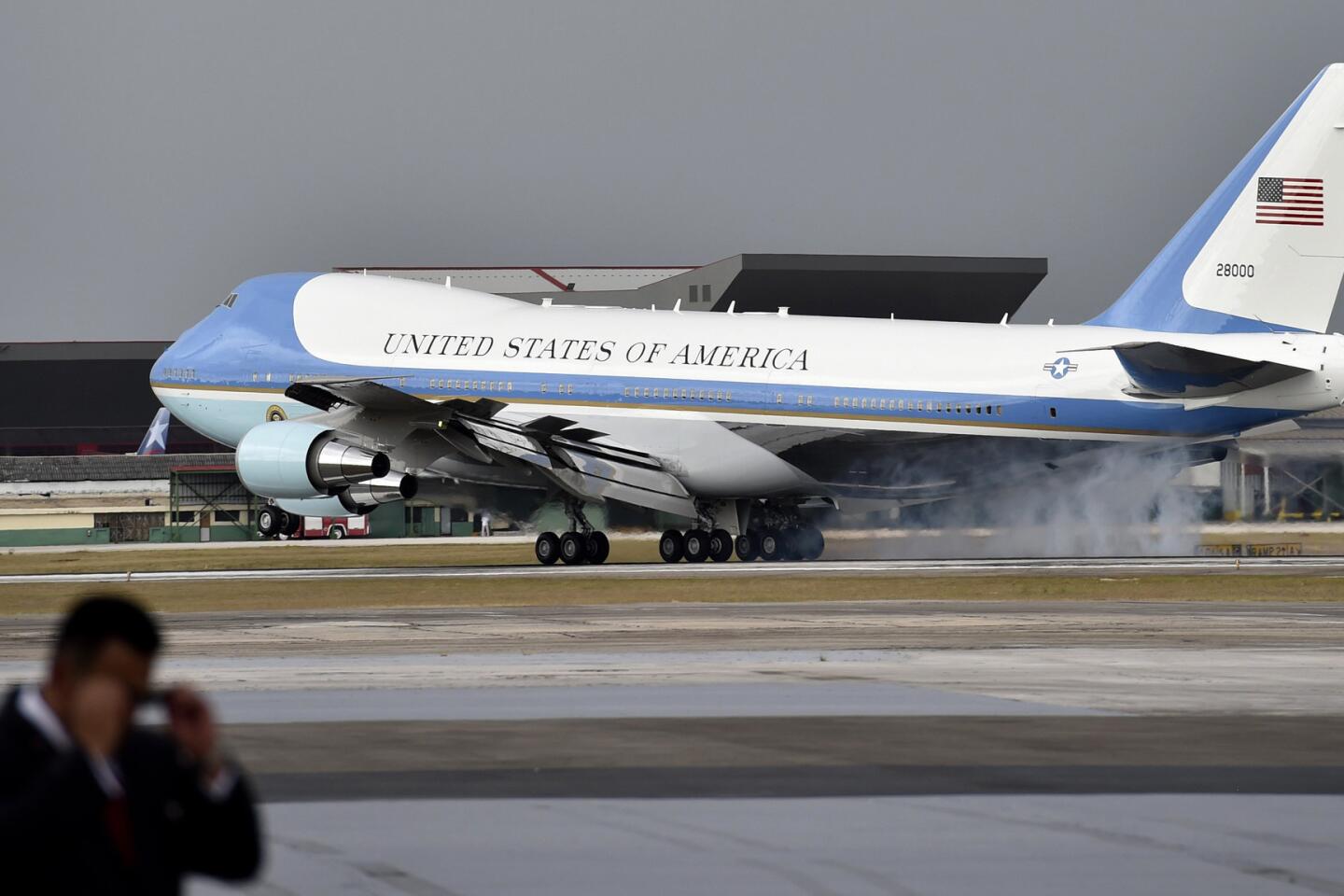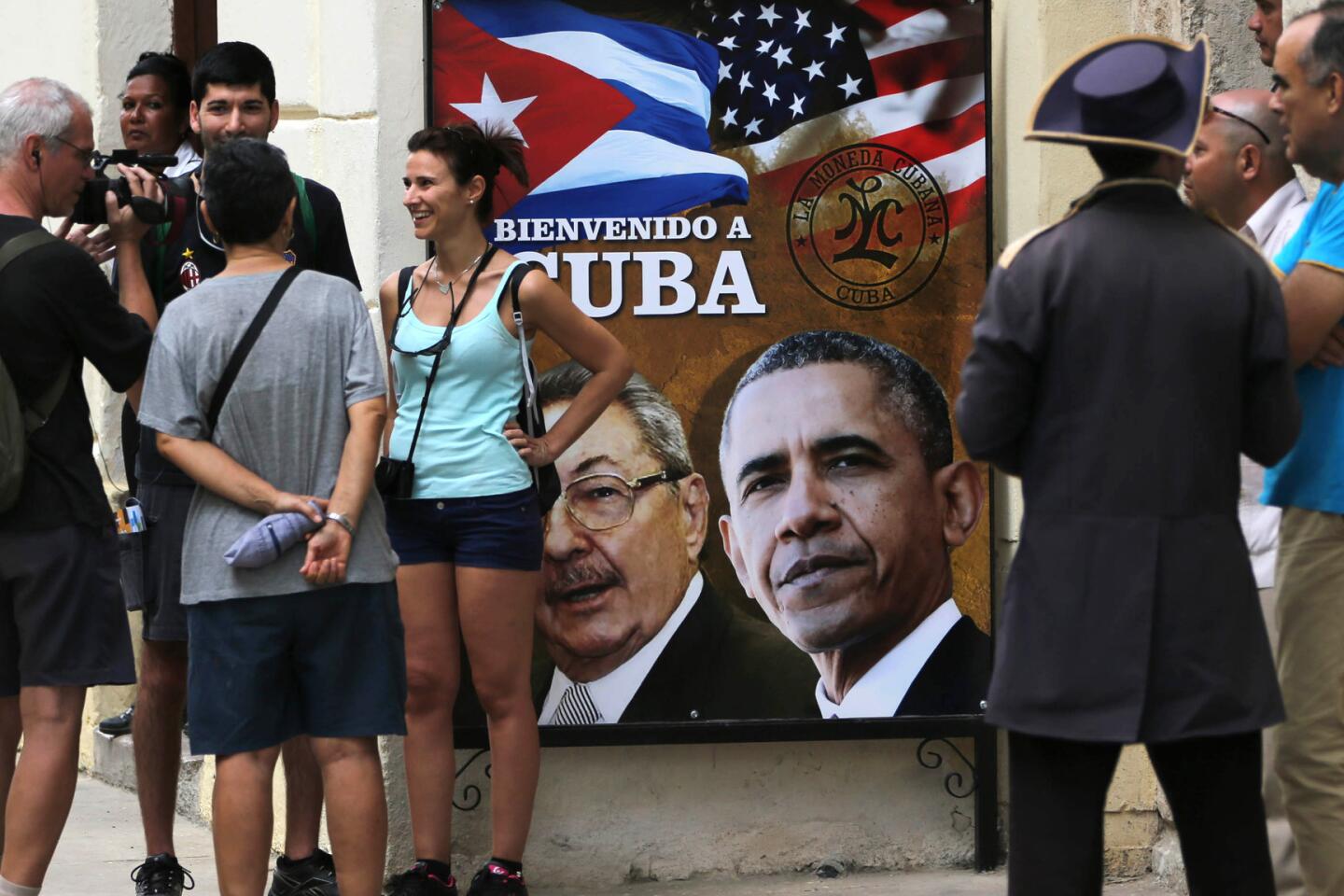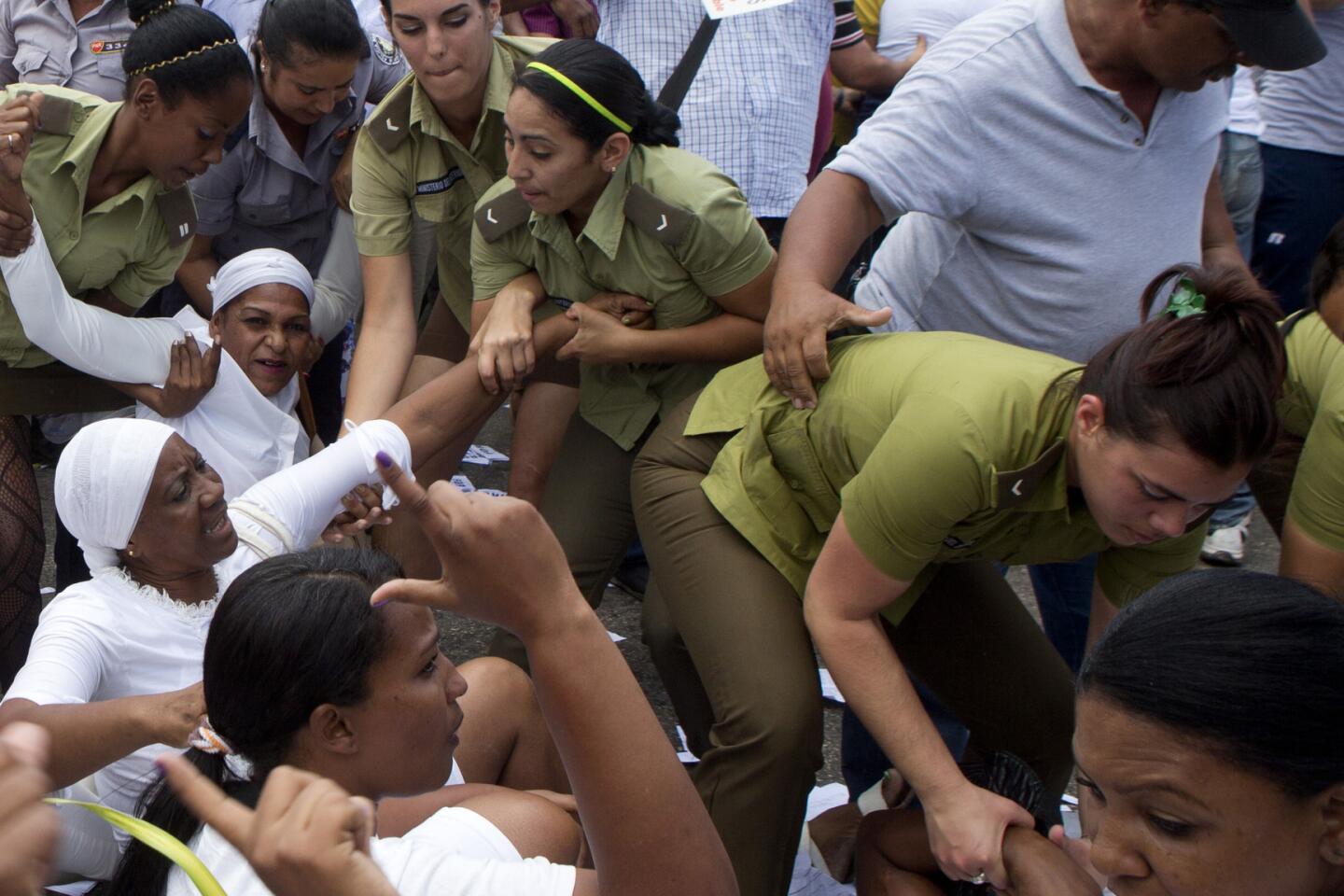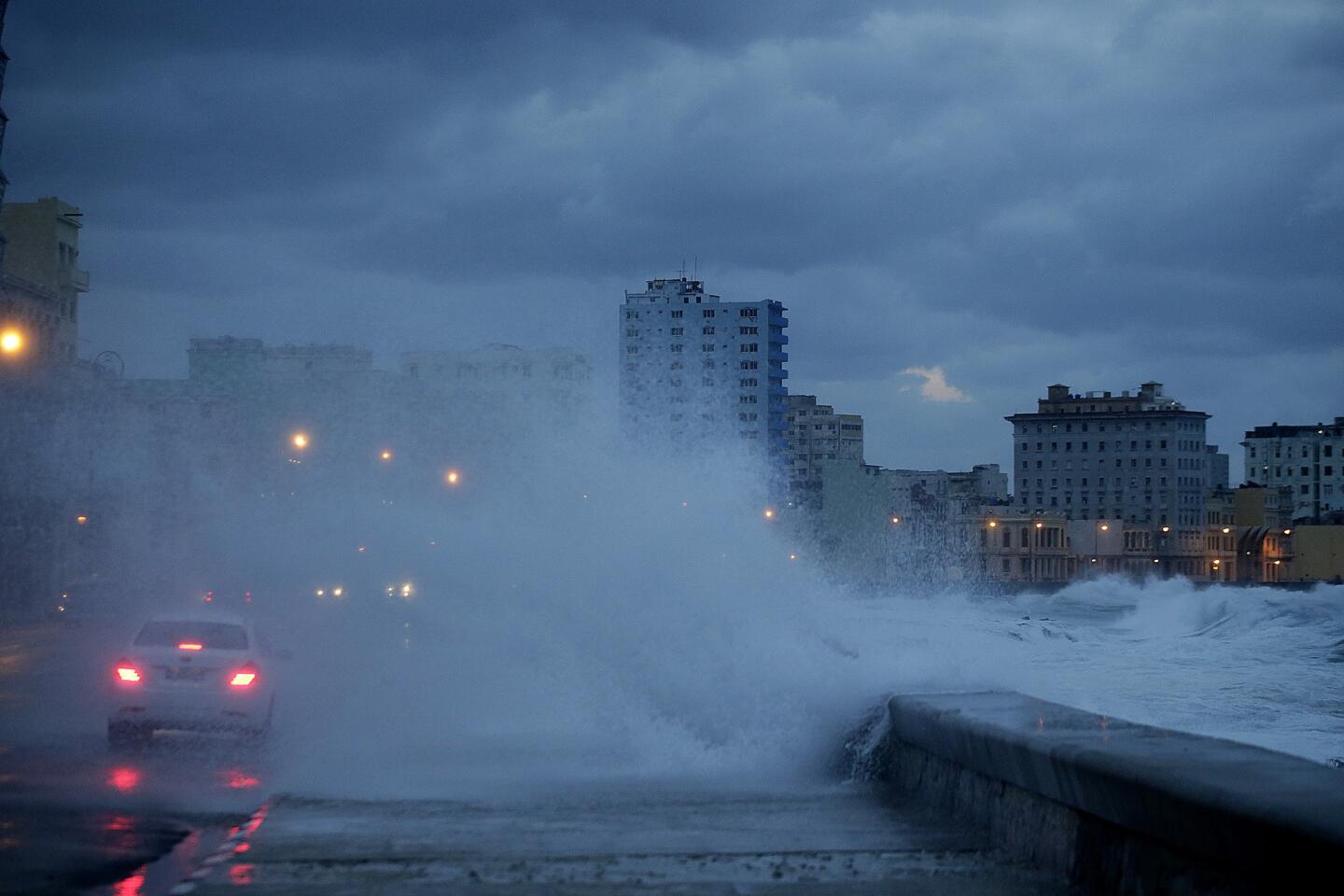‘This is a historic visit and a historic opportunity,’ President Obama says in Cuba
- Share via
Reporting from Havana — President Obama set foot in Cuba on Sunday, the first sitting U.S. president in nearly 90 years to visit this island nation, amid hopes that his push to mend a half-century of Cold War enmity will launch a new era of cooperation.
“This is a historic visit and a historic opportunity,” Obama said shortly after Air Force One delivered him, wife Michelle, their two daughters and a large entourage to the rainy Cuban capital.
Under large black umbrellas, Obama and his family were greeted by top Cuban officials, including Foreign Minister Bruno Rodriguez and the ministry’s Americas director, Josefina Vidal. Obama’s formal welcoming ceremony with President Raul Castro takes place Monday.
Obama is making this trip to solidify his long efforts to normalize diplomatic relations with Cuba, to make the process irreversible under a future administration, and to improve the United States’ standing throughout Latin America.
In his first act here, Obama met with the staff of the American Embassy, itself established only last summer. He joked about the last U.S. president, Calvin Coolidge, to come to Cuba.
“Back in 1928, President Coolidge came on a battleship; it took him three days to get here,” Obama said. “It only took me three hours.”
He said this three-day visit was “only a very first step,” adding, “Como andan?” (“How’s it going?”)
Later, the Obamas toured the architectural gem that is Old Havana, escorted by the city’s historian, Eusebio Leal, who showed them a 19th century portrait of Abraham Lincoln at a colonial-era palace. Crowds outside cheered Obama, who at one point waved to photographers and called out, “Gracias!”
The Obamas also met with Cardinal Jaime Ortega, the top Roman Catholic official in Cuba who was instrumental, along with Pope Francis, in promoting the U.S.-Cuba rapprochement that led to the December 2014 announcement of renewed diplomatic ties between the two countries.
Since then, the U.S. has lifted numerous restrictions on travel, trade and banking transactions with Cuba. The Castro government, on the other hand, has been slow to follow in kind.
Although Castro is eager to welcome Obama, his government is also determined to reassert its own socialist values that it insists will not be bent to U.S. will.
In recent days, Cuban officials have said that only lifting the half-century-old U.S. economic embargo against Cuba — and not the smaller measures announced by the Obama administration — will significantly benefit the Cuban people.
“Certain U.S. government officials have stated lately that the objective of these new measures is to ‘empower’ the Cuban people,” Rodriguez said huffily late last week.
“The Cuban people empowered themselves decades ago,” Rodriguez said, referring to the 1959 revolution that brought Fidel Castro to power and installed a communist government that would become the Western Hemisphere’s staunchest Cold War foe of the United States.
“In our [new] relationship with the United States, under no circumstance is the realization of internal changes in Cuba on the negotiation table,” he said.
Any additional changes in Cuba, which was already allowing a measure of free enterprise and public expression, will most probably not come until after next month’s annual congress of the Communist Party.
Several hours before Obama’s arrival, Cuban security agents and pro-government demonstrators broke into the weekly protest march by the Ladies in White group, an organization of the wives and daughters of current or former political prisoners.
There was noisy scuffling as the Ladies attempted to stage a sit-in along their weekly route on 5th Avenue, and the pro-government groups shouted slogans honoring the Castros. Plainclothes agents eventually rounded up several dozen members of the Ladies group and hauled them away in buses. It was unclear how long they will be held, but the government wants to prevent meetings of dissidents with the Obama delegation.
The issue continues to roil this historic trip.
The White House has insisted that the president will see whomever he wants.
But a leading human rights activist told the Los Angeles Times that many dissidents were ordered by Cuban security officials to stay inside their homes during Obama’s visit and skip their meeting with him. They plan to defy the order, Elizardo Sanchez said, and U.S. Embassy officials were setting up transportation for the activists.
Such controversy aside, Obama’s visit was met with excitement and enthusiasm from ordinary Cubans.
In the bar at Havana’s Parque Central hotel, Cuban staff gathered around a television to watch Air Force One touch down.
When Obama and his family emerged from the plane, waving, chef Alejandro Chirino laughed and smiled.
“I feel so happy, like the rest of the world,” said Chirino, 43.
Bartender Sahely Monduy said the history-making moment marks the end of an era.
“Right now, we forget the past,” she said. “We need to leave all that has happened between our countries behind.”
Monduy, who has an uncle in Los Angeles, said it’s time Cuba and the U.S., separated by just 90 miles of water, focus on what they have in common. “We are family,” she said.
Guillermo Martin Sanchez, 27, who had ducked under a balcony in Old Havana during the heavy rain, said he hopes Obama’s visit leads to a swift end of the U.S. embargo.
But that will not immediately solve Cuba’s economic woes, Sanchez said.
“The problem here is with our own government and how it runs our economy,” he said. “The price of things goes up quicker than the salaries do.”
He urged Obama to “see the real Cuba, not the one for tourists.”
“He needs to see how we live, how we suffer,” Sanchez said.
Obama believes the steps toward normalization will ultimately benefit U.S. economic and diplomatic interests — the delegation also included business leaders and entrepreneurs such as chef Jose Andres, Xerox CEO Ursula Burns and officials of Starwood and Marriott — whereas Cuba will change only at its own, slow pace.
The Cuban government wants to hold its ground against Washington to exhibit strength, especially for its traditional leftist allies and harder-line elements of the government and Cuban society. Obama has been criticized at home for seemingly making numerous concessions in exchange for very little from Havana, but that is how both sides, for different reasons, apparently want it.
“Cuba will change on Cuba’s time,” said Kevin Casas-Zamora, a former Costa Rican vice president now at the Inter-American Dialogue think tank in Washington.
Times staff writer Tracy Wilkinson in Washington contributed to this report.
Twitter: @cparsons, @TracyKWilkinson
ALSO
What should President Obama do on his visit to Cuba? We have some suggestions
President Obama is coming to Cuba today. So why are so many Cubans leaving?
Cuba ordering its dissidents to skip meeting with Obama
More to Read
Sign up for Essential California
The most important California stories and recommendations in your inbox every morning.
You may occasionally receive promotional content from the Los Angeles Times.
